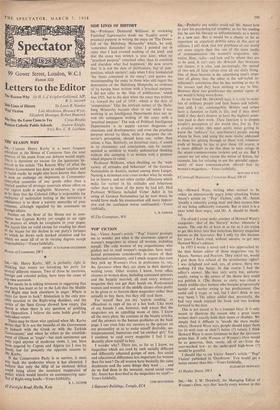SIDE LINES OF HISTORY
SIR,—Professor Desmond Williams in reviewing Vanished Supremacies made me 'frankly avow' a practical purpose in writing the essay on 'The Down- fall of the Habsburg Monarchy' which, he said, 'somewhat diminishes' its value. I pointed out in reply that 1 had avowed nothing of the kind, and that the essay was written 'a year later, when ho "practical purpose" remained other than to establish and elucidate what had happened. He now retorts that 'it is not the date of publication, but of com- position, which matters'; asks when I first formulated 'the thesis contained in the essay'; and quotes my recommending the essay to those who still regret the destruction of the Habsburg Monerchy as evidence of its having been written with a practical purpose. I did not refer to the 'date of publication,' which was 1921, but to the date when the essay was written, i.e. toward the end of 1919: which is the date of 'composition' That the intricate nature of the Habs- burg Monarchy became clear to me while I was working in an Intelligence Department does not in- vest the subsequent writing of the essay with a 'practical purpose.' The task of Political Intelligence Departments is to supply correct diagnoses of situations and developments; and even the practical purpose served by them, while it sharpens the ob- server's perception, should keep out, rather than infuse, a bias. Similarly, an historical essay, if sound in its statements and conclusions, can be 'recom- mended as antidote to woolly unhistorical thinking without this stamping it as written with a purpose which impairs its value.
Professor Williams, when dwelling on the 'wide variety of attitudes and behaviour' of the German Nationalists in Austria, named among them Lueger. Naming a statesman tout court evokes what he stands for in history, and not other earlier affiliations which make for variety in his attitudes and behaviour rather than in those of the party he had left. Had Professor Williams included Victor Adler in his string of German Nationalists (as he now does), he would have made his enumeration still more impres- sive, and the confusion worse confounded.—Yours faithfully,


































 Previous page
Previous page